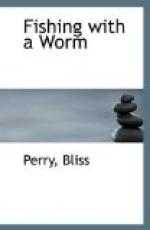One’s memories of such fishing, however agreeable they may be, are not to be identified with a defense of the practice. Yet, after all, the most effective defense of worm-fishing is the concrete recollection of some brook that could be fished best or only in that way, or the image of a particular trout that yielded to the temptation of an angleworm after you had flicked fly after fly over him in vain. Indeed, half the zest of brook fishing is in your campaign for “individuals,”—as the Salvation Army workers say,—not merely for a basketful of fish qua fish, but for a series of individual trout which your instinct tells you ought to lurk under that log or be hovering in that ripple. How to get him, by some sportsmanlike process, is the question. If he will rise to some fly in your book, few fishermen will deny that the fly is the more pleasurable weapon. Dainty, luring, beautiful toy, light as thistle-down, falling where you will it to fall, holding when the leader tightens and sings like the string of a violin, the artificial fly represents the poetry of angling. Given the gleam of early morning on some wide water, a heavy trout breaking the surface as he curves and plunges, with the fly holding well, with the right sort of rod in your fingers, and the right man in the other end of the canoe, and you perceive how easy is that Emersonian trick of making the pomp of emperors ridiculous.
But angling’s honest prose, as represented by the lowly worm, has also its exalted moments. “The last fish I caught was with a worm,” says the honest Walton, and so say I. It was the last evening of last August. The dusk was settling deep upon a tiny meadow, scarcely ten rods from end to end. The rank bog grass, already drenched with dew, bent over the narrow, deep little brook so closely that it could not be fished except with a double-shotted, baited hook, dropped delicately between the heads of the long grasses. Underneath this canopy the trout were feeding, taking the hook with a straight downward tug, as they made for the hidden bank. It was already twilight when I began, and before I reached the black belt of woods that separated the meadow from the lake, the swift darkness of the North Country made it impossible to see the hook. A short half hour’s fishing only, and behold nearly twenty good trout derricked into a basket until then sadly empty. Your rigorous fly-fisherman would have passed that grass-hidden brook in disdain, but it proved a treasure for the humble. Here, indeed, there was no question of individually-minded fish, but simply a neglected brook, full of trout which could be reached with the baited hook only. In more open brook-fishing it is always a fascinating problem to decide how to fish a favorite pool or ripple, for much depends upon the hour of the day, the light, the height of water, the precise period of the spring or summer. But after one has decided upon the best theoretical procedure, how often the stupid trout




